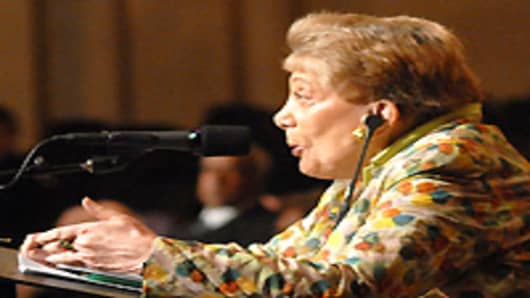But all that seems to be forgotten this year. Sure, you’ve had shareholder resolutions about handling foreclosures, and the odd complaint about executive pay, but the meetings have lost their zing. And they seem to be over almost before they’ve started.
Case in point: Today James Gorman presided over his first annual meeting solo since becoming Morgan Stanley CEO in January 2010. Unlike last year’s meeting where he introduced the new CEO, Chairman John Mack piped up only once to make a joke. Gorman must have been relieved, the whole ordeal lasted only 42 minutes. That’s not the shortest annual meeting on record— some in the 1990s lasted only 20 minutes, according to a Morgan Stanley spokeswoman—but it's certainly the shortest in years.
Even industry darling Jamie Dimon didn’t get off so lightly this year. At JPMorgan’s annual meeting yesterday, he had to endure a good 45 minutes of pummeling by shareholders on the subject of mortgage foreclosures. One attendee from Cincinnati said that Chase’s foreclosures were causing neighborhood blight in his home county, and made an impassioned plea for help. Dimon sounded downright depressed when he replied “We’re trying.” Still, the whole meeting weighed in at a barely respectable hour-and-a-half.
Goldman Sachs’s meeting on May 6 was closer to two hours, but the voluble Evelyn Y. Davis attended that one in order to ask Lloyd Blankfein to step down. “You’ll get over it,” she encouraged him.
While Gorman had to sit through a lengthy, and quite cogent plea from the respresentative of the Fathers of Maryknoll to stop trying to kill Dodd-Frank before it’s even implemented, he got off largely unscathed. Nobody even asked about New York Attorney General Schneiderman’s investigation into Morgan Stanley’s mortgage securitizations that was announced Monday.
The one exchange that could have been tricky was with a shareholder from Purchase, New York where the meeting was held. He demanded to know why Morgan Stanley wasn’t raising its dividend. Fair question. Goldman will pay 35 cents a share on its next payout date, and JPMorgan will pay 25 cents. Morgan Stanley is still at a nickel a share.
Gorman’s response:“Historically our dividend yield has been significantly lower than some of the traditional banking stocks because it's a different character of company and security. But it's something we take into account and continue to take into account as we go through our capital planning.”
He said he wouldn’t “speculate” as to when the board might choose to raise the dividend.
That was it—no body blows, no yelling, no fake blood. It’s enough to make you yearn for another crisis.
_____________________________________________
Questions? Comments? Email us atNetNet@cnbc.com
Follow NetNet on Twitter @ twitter.com/CNBCnetnet
Facebook us @ www.facebook.com/NetNetCNBC


